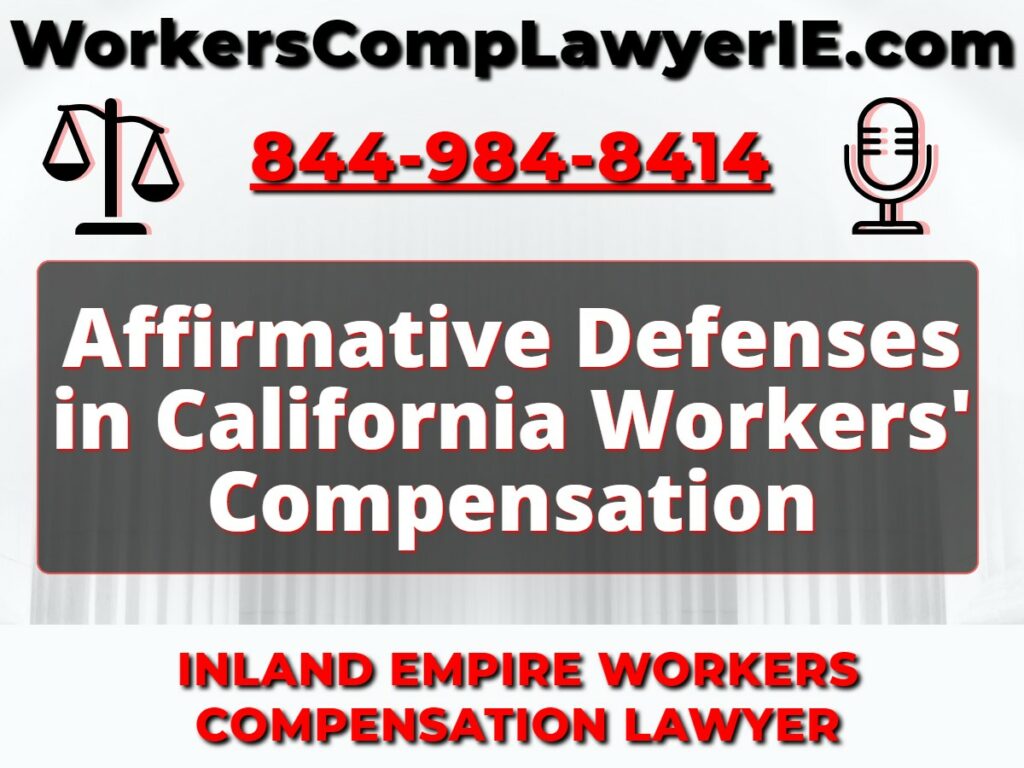Affirmative Defenses in California Workers’ Compensation

Introduction to Affirmative Defenses in California Workers’ Compensation
Navigating through the complex maze of workers’ compensation in California can be challenging, especially if you’re an injured worker. It’s a world full of legal jargon and procedures that might seem foreign. Among these complex procedures and defenses is something known as an ‘affirmative defense’. As a worker or an injured employee in California, understanding these defenses is crucial to safeguard your rights.
Understanding Affirmative Defenses
So, what are affirmative defenses? In the context of workers’ compensation, they’re reasons the employer or insurance company might give to limit or completely deny your claim. They are pivotal points that could drastically influence the outcome of your workers’ compensation claim.
Common Affirmative Defenses in Workers’ Compensation Cases
Let’s delve into some of the most commonly encountered affirmative defenses in California’s workers’ compensation cases:
Statute of Limitations: The law in California requires that you report your work-related injury within a certain timeframe. Failing to do so can result in your claim being denied. For instance, consider the case of a construction worker who didn’t immediately report a back injury, thinking it was insignificant. A year later, the pain became unbearable, only for him to discover he had missed the reporting deadline.
Employee Negligence: An employer may argue that an employee’s negligence contributed to their injury, therefore disqualifying them from compensation. Imagine a warehouse worker ignoring safety protocols and ending up injured; their claim may be denied due to their own negligence.
Failure to Give Notice: California law mandates that you inform your employer of your injury within 30 days. Failing to give this notice could mean losing your right to compensation. Take, for example, a secretary who developed carpal tunnel but didn’t inform her employer in time, jeopardizing her claim.
Independent Contractor Status: If you’re considered an independent contractor rather than an employee, you may not be eligible for workers’ compensation. This scenario might apply to a freelance graphic designer who gets injured while working, but isn’t technically an employee.
Navigating Affirmative Defenses
Knowing how to handle these defenses properly can significantly impact the success of your claim. Employers and insurance companies often have experienced legal teams to back them up, making it essential to seek professional help when handling these defenses.
How Legal Assistance Can Help
The complex landscape of workers’ compensation, particularly in California, calls for specialized legal assistance. An experienced workers’ compensation attorney understands these affirmative defenses, knows how to counter them, and can guide you through the entire process. There have been countless instances where legal counsel made a significant difference, such as when a worker was initially denied compensation due to the employer’s claim of negligence, but with the aid of a competent attorney, the worker managed to prove otherwise and secured their rightful compensation.
Conclusion to Affirmative Defenses in California Workers’ Compensation
The importance and potential impact of affirmative defenses in California workers’ compensation cases cannot be overstated. It’s crucial for injured workers to understand these defenses, know their rights, and seek appropriate legal help when faced with these defenses. If you’re an injured worker in need of legal assistance, don’t navigate these waters alone. Call us at (844) 984-8414 and secure a free consultation. Your rights matter, and we’re here to help you protect them.
